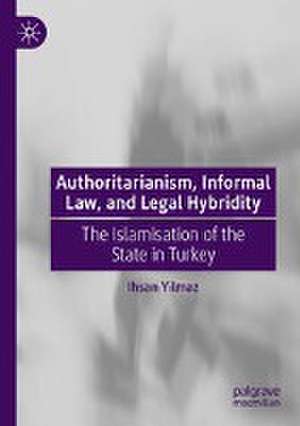Authoritarianism, Informal Law, and Legal Hybridity: The Islamisation of the State in Turkey
Autor Ihsan Yilmazen Limba Engleză Paperback – 8 apr 2023
To that end, the book argues that the AKP has paved the way for Islamist legal hybridity where society, state, and law, are being gradually Islamised on an ad hoc basis. Informal law and legal pluralism in Turkey have had a non-state characteristic which have permitted Muslims to solve disputes by seeking the opinions of religio-legal scholars. Yet under the AKP rule, this informal legal system has become increasingly dominated by conservatives, sometimes radical Islamists, which the governing party has taken advantage of by either formalizing some partsof the informal Islamist law, or using it informally to mobilize its supporters against the opposition.
| Toate formatele și edițiile | Preț | Express |
|---|---|---|
| Paperback (1) | 724.56 lei 6-8 săpt. | |
| Springer Nature Singapore – 8 apr 2023 | 724.56 lei 6-8 săpt. | |
| Hardback (1) | 728.82 lei 6-8 săpt. | |
| Springer Nature Singapore – 7 apr 2022 | 728.82 lei 6-8 săpt. |
Preț: 724.56 lei
Preț vechi: 883.62 lei
-18% Nou
Puncte Express: 1087
Preț estimativ în valută:
138.65€ • 148.26$ • 115.60£
138.65€ • 148.26$ • 115.60£
Carte tipărită la comandă
Livrare economică 17 aprilie-01 mai
Preluare comenzi: 021 569.72.76
Specificații
ISBN-13: 9789811902789
ISBN-10: 981190278X
Pagini: 258
Ilustrații: VII, 258 p. 1 illus.
Dimensiuni: 148 x 210 mm
Greutate: 0.36 kg
Ediția:1st ed. 2022
Editura: Springer Nature Singapore
Colecția Palgrave Macmillan
Locul publicării:Singapore, Singapore
ISBN-10: 981190278X
Pagini: 258
Ilustrații: VII, 258 p. 1 illus.
Dimensiuni: 148 x 210 mm
Greutate: 0.36 kg
Ediția:1st ed. 2022
Editura: Springer Nature Singapore
Colecția Palgrave Macmillan
Locul publicării:Singapore, Singapore
Cuprins
Chapter 1: Informal Institutions, Unoffical Laws and Legal Hybridity in Turkey.- Chapter 2: Informal Laws, Islamist Legal Hybridity and Its Producers.- Chapter 3: Towards an Islamist Hybrid Family Law.- Chapter 4: Sharia, Legal Hybridity, and Islamization of Social Life.- Chapter 5: Islamist Legal Hybridity on Economy.- Chapter 6: Islamist Informal Laws on Corruption.- Chapter 7: Islamist Legal Hybridity on Government and Opposition.- Chapter 8: Authoritarianism, Informal Law, and Legal Hybridity.
Notă biografică
Ihsan Yilmaz is Research Professor and Chair at the Alfred Deakin Institute for Citizenship and Globalisation, Deakin University, Melbourne, Australia. He has conducted mixed method research on authoritarianism, legal pluralism, nation-building, citizenship, Islam–state–law relations in majority and minority contexts (Turkey, Pakistan, Egypt, Indonesia, UK, USA and Australia), Islamism, populism, transnationalism, ethnoreligious and political minorities, securitisation, and intergroup relations. He was Professor of Political Science at Istanbul Fatih University (2008–2016), Lecturer in Law, Social Sciences and Politics at SOAS, University of London (2001–2008), and a fellow at Centre for Islamic Studies, the University of Oxford (1999–2001).
Textul de pe ultima copertă
This book investigates Turkey’s departure from a ‘flawed democracy’ under Kemalist secularism, and its transitioning into Islamist authoritarian Erdoğanism, through the lenses of informal law, legal pluralism, and legal hybridity. In doing so, it examines the attempts of Turkey’s ruling party (AKP) at social engineering and gradual Islamisation of the Turkish state and society, by using informal Islamist laws.
To that end, the book argues that the AKP has paved the way for Islamist legal hybridity where society, state, and law, are being gradually Islamised on an ad hoc basis. Informal law and legal pluralism in Turkey have had a non-state characteristic which have permitted Muslims to solve disputes by seeking the opinions of religio-legal scholars. Yet under the AKP rule, this informal legal system has become increasingly dominated by conservatives, sometimes radical Islamists, which the governing party has taken advantage of by either formalizing some parts of the informal Islamist law, or using it informally to mobilize its supporters against the opposition.
Ihsan Yilmaz is Research Professor and Chair at the Alfred Deakin Institute for Citizenship and Globalisation, Deakin University, Melbourne, Australia. He has conducted mixed method research on authoritarianism, legal pluralism, nation-building, citizenship, Islam–state–law relations in majority and minority contexts (Turkey, Pakistan, Egypt, Indonesia, UK, USA and Australia), Islamism, populism, transnationalism, ethnoreligious and political minorities, securitisation, and intergroup relations. He was Professor of Political Science at Istanbul Fatih University (2008–2016), Lecturer in Law, Social Sciences and Politics at SOAS, University of London (2001–2008), and a fellow at Centre for Islamic Studies, the University of Oxford (1999–2001).
Ihsan Yilmaz is Research Professor and Chair at the Alfred Deakin Institute for Citizenship and Globalisation, Deakin University, Melbourne, Australia. He has conducted mixed method research on authoritarianism, legal pluralism, nation-building, citizenship, Islam–state–law relations in majority and minority contexts (Turkey, Pakistan, Egypt, Indonesia, UK, USA and Australia), Islamism, populism, transnationalism, ethnoreligious and political minorities, securitisation, and intergroup relations. He was Professor of Political Science at Istanbul Fatih University (2008–2016), Lecturer in Law, Social Sciences and Politics at SOAS, University of London (2001–2008), and a fellow at Centre for Islamic Studies, the University of Oxford (1999–2001).
Caracteristici
Explores the instrumentalization of Islamist legal pluralism by the Justice and Development Party (AKP) in Turkey Shows how its selective favouritism towards Sunni Islam is as destructive as the Kemalist philosophy Argues for alterations to better accommodate the informal legal systems of marginalized groups
